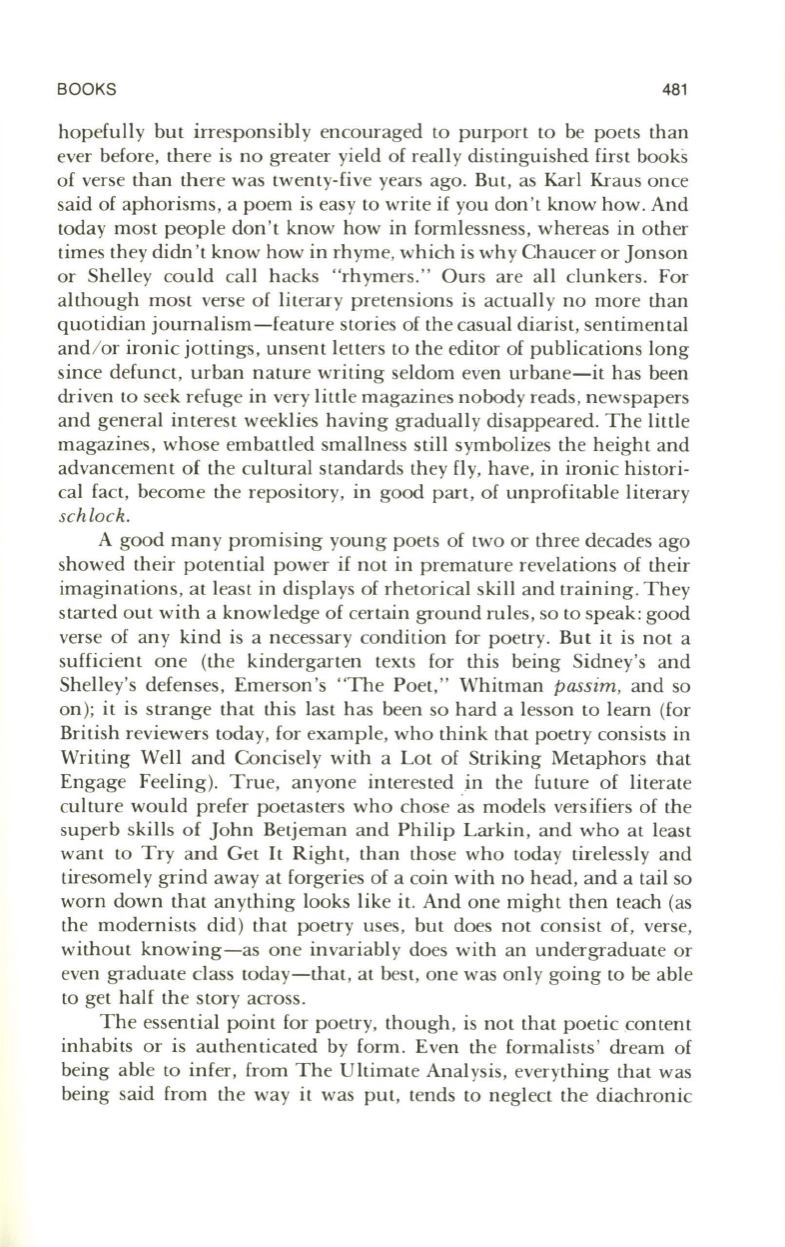
BOOKS
481
hopefully but irresponsibly encouraged to purport to be poets than
ever before, there is no greater yield of reall y distinguished first books
of verse than there was twenty-five years ago. But, as Karl Kraus once
said of aphorisms, a poem is easy to write if you don't know how. And
today most people don't know how in formlessness, whereas in other
times they didn't know how in rhyme, which is why Chaucer or Jonson
or Shelley could call hacks "rhymers." Ours are all clunkers. For
although most verse of literary pretensions is actually no more than
quotidian journalism-feature stories of the casual diarist, sentimental
and/ or ironic jottings, unsent letters to the editor of publications long
since defunct , urban nature writing seldom even urbane-it has been
driven to seek refuge in very little magazines nobody reads, newspapers
and general interes t weeklies having gradually disappeared. The little
magazines, whose embattled smallness still symbolizes the height and
advancement of the cultural standards they fly, have, in ironic histori–
cal fact , become the repository, in good part, of unprofitable literary
schlock.
A good many promising young poets of two or three decades ago
showed their potential power if not in premature revelations of their
imaginations, at leas t in displays of rhetorical skill and training. They
started out with a knowledge of certain ground rules, so
to
speak: good
verse of any kind is a necessary condition for poetry. But it is not a
sufficient one (the kindergarten texts for this being Sidney'S and
Shelley'S defenses , Emerson's "Th e Poet, " Whitman
passim,
and so
on); it is strange that this last has been so hard a lesson to learn (for
British reviewers today, for example, who think that poetry consists in
Writing Well and Concisely with a Lot of Striking Metaphors that
Engage Feeling). True, anyone interes ted .in the future of literate
culture would prefer poetasters who chose as models versifiers of the
superb skills of John Betjeman and Philip Larkin , and who at leas t
want to Try and Get It Right, than those who today tirelessly and
tiresomely grind away at forgeries of a coin with no head, and a tail so
worn down that anything looks like it. And one might then teach (as
the modernists did) that poetry us es, but does not consist of, verse,
without knowing-as one invariably does with an undergraduate or
even graduate class today-that, at bes t, one was only going to be able
to get half the story across.
The essential point for poetry, though, is not that poetic content
inhabits or is authenticated by form . Even the formalists ' dream of
being able to infer, from The Ultimate Analysis, everything that was
being said from the way it was put, tends to neglect the diachronic


